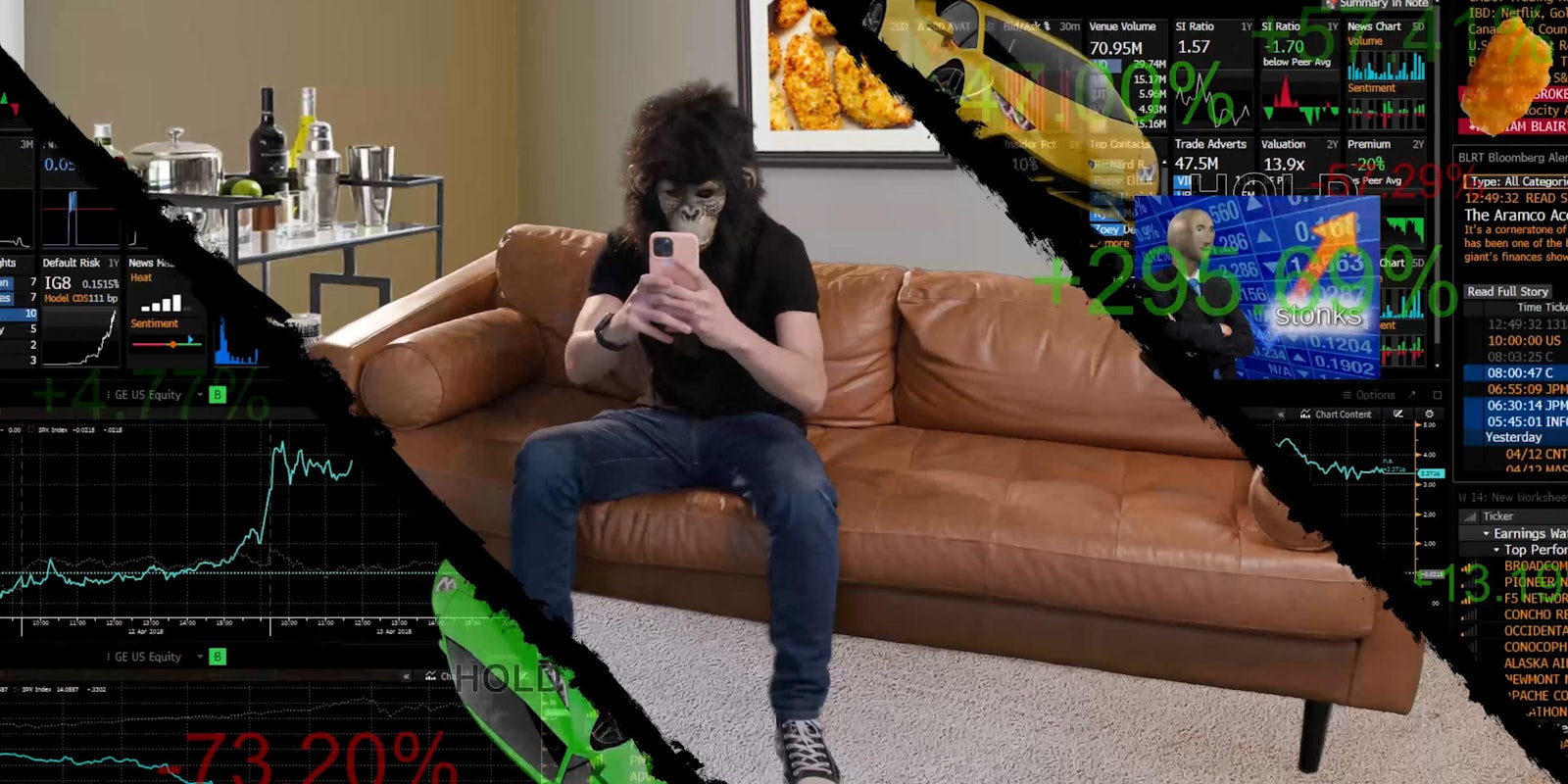“People are at a breaking point,” former Iowa Congresswoman Cindy Axne says in director Ondi Timoner’s newest documentary The New Americans: Gaming a Revolution, which premiered at SXSW. “The more money that you’ve got in your pocket, and the more power you can wield with that, that’s the American Way.” Her statement is followed immediately with a definition of the word “oligarchy,” read by a legless, eyeless floating robot, who often defines concepts for us and whose presence organizes and bookends the film.
Director: Ondi Timoner
Release: Theatrical
‘The New Americans’ manages to expertly toe the line between cohesion and information overload, and it asks what it means to be an American—and what happens next.
This animated video game droid (username: playing4keeps) is our host through the “revolution game,” a structural device for an ambitious film tackling several huge concepts (finance, media, extremism) and employing a mishmash of mediums (first-person interviews, YouTube videos, TikToks, news and movie clips, memes upon memes upon memes), a simulacrum of a browser window with dozens of open tabs.
Cleverly, the story is told in the fast-paced internet language that drives it. On the flip side, it can be overwhelming at times, with endless threads to unpack and countless players to keep track of; it’s helpful to have playing4keeps lead us through the various revolution “levels” that seek to contextualize and eventually tie 2021’s Jan. 6 Capitol riot to the GameStop short squeeze that occurred just three weeks later.
Intentional or not, this duality is a prevalent theme in the film: the internet is good, and the internet is bad. There is power in numbers (good), and there is power in numbers (bad).
This same bifurcation is true of the speed at which information spreads (good when it’s true, bad when it’s false), and the ease of finding community (good when it disrupts corrupt and predatorial systems, bad when it involves Nazis). A mob screwed corrupt Wall Street out of billions, a mob did an insurrection. A hive mentality democratized the financial playing field, a hive mentality threatened the pillars of our democracy. The American dream became a nightmare.
So how did we get here?
The film gives us a timeline for context: the loss of privacy and human intimacy brought about by broadband internet (a topic Timone explores in depth in her 2009 documentary We Live in Public) resulted in a generation plagued by emotional and spiritual isolation (the internet is good, the internet is bad). Corporate greed brought about the 2008 banking crisis, leading to Occupy Wall Street, the loudest populist movement against widespread economic inequality since the Great Depression. The first decentralized blockchain was born. Forced confinement imposed by the COVID-19 pandemic resulted in the growth of online communities, the explosion of cryptocurrency, and the subsequent rise of the retailer trader, all of which culminated eventually in r/WallStreetBets (WSB). WSB activated 300,000 people with brokerage accounts to take on Wall Street (WSB good) and was then easily infiltrated and taken over by white supremacists and QAnon conspiracy theorists (WSB bad).
Dozens of players help tell these two tales of insurrection: WSB founder Jaime Rogozinski, who was pushed out of the subreddit by anti-semites. Reddit founder Alexis Ohanian, who resigned as CEO over the companies’ inaction against extremism. Anthony Scaramucci, who talks about how Trump let the insurrection happen. Andrew Left, who publicly bet against WSB and had his children’s lives threatened (WSB bad, even pre-Nazis). Also influencers, content creators, teenage crypto millionaires, journalists, economists, politicians, housewife “apes,” the “real Wolf of Wall Street” Jordan Belfort, and many others, interview footage fast-cut with memes and Reels and TikToks.
If this all seems like a lot to cover in a lot of different ways, that’s because it is. But that’s how life is, and that’s how the internet is, and The New Americans manages to expertly toe the line between cohesion and information overload, binding the “squeeze of a lifetime” to the Capitol riot and positioning the two as tipping points in our current zeitgeist to ask: what does it mean to be an American? And what happens next?
Nothing good, Timoner seems to reply. The film is not optimistic about the future, and honestly, why would it be? The boundary between the “real world” and the digital world may have dissolved, but the issues that have been plaguing America since forever remain the same: a nation divided by a massive and ever-growing gap in wealth and ideology and tolerance. The internet just made it a whole lot faster and easier to find like-minded people to be angry with.
These questions are especially timely considering the second and third-largest bank failures in U.S. history just happened within days of each other—the most significant financial occurrence since the 2008 financial crisis which, if you’ll recall, is how we got here in the first place. It is notable that 2008 repeating itself was precisely what the tech dudes at Silicon Valley Bank (SVB) and Signature Bank were stoking panic over and that many of these investors spent years and millions fighting government regulation only to turn to the government when they alarmed one another enough to topple a large financial institution. The very same government bailing out venture capitalists within 48 hours is cutting food stamps, involuntarily booting folks from Medicaid at record numbers, and refusing to cancel student debt.
So how did we get here? Maybe we never really left. Being an American has always meant living in an oligarchy after all, and 2008 is already repeating itself. The coming insurrections will be worse this time around.
“We’re going to see people stepping up, whether it’s the insurrection or with Wall Street, to address the issues that they think are unfair in this country,” Axne said. “Because they don’t think that it’s happening fast enough for them. And you know what? They’re right.”

